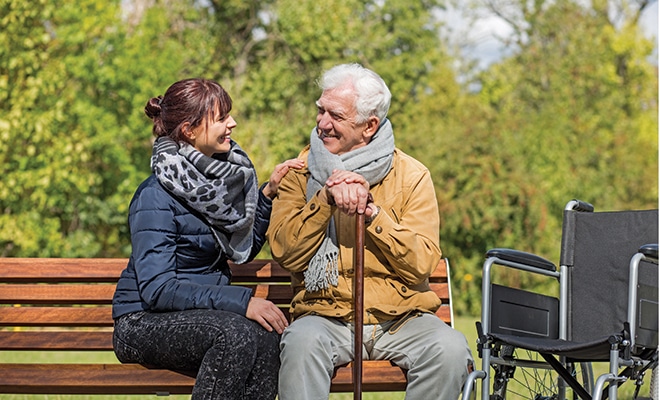COVID-19 & Grief
 By Meredith English, MSHS
By Meredith English, MSHS
Delaware Hospice, Bereavement Counselor
As essential workers continue fighting the pandemic, many are left wondering if there is an end in sight. Collectively, everyone is grieving the loss of many things and normal coping strategies, either don’t work or are not possible. The sense of normalcy and safety have changed our support systems. Friends and family have their plates full as they navigate their own fears. The constant worry for our children and seniors have many feeling defeated, and over time it begins to feel surreal.
COVID-19 has changed the way we do everything and the constant change is exhausting. Those who have lost a loved one, could have complicated grief due to the policies in place to keep us all safe. Many have been unable to visit with dying loved ones. They have unanswered questions as the medical community struggles to fully understand the virus. The funeral or celebration-of-life is different than families had hoped for. The families are left with fears about passing the virus on to others or worrying about those who are alone day-in and day-out. This can delay or prolong the grief, as grief is a journey you must walk through, not around.
Through it all, we have adapted, and switched to the best options to stay connected. Many have learned how to get online and seek medical help or join virtual support groups. While we long to be in-person, we must settle for the next best thing and remind ourselves that we are all doing the best we can and it is okay, to not be okay right now.

Five ways to help grieve during COVID-19
Carve out time to grieve No one needs to tell you to miss your loved one, you are already doing that. However, take time every day to journal, read, listen to a podcast, or simply “talk” to your loved one without any distractions. This can help you identify where you are at and helps combat any avoidance or guilt that is common with grief.
Identify a support person Have one person that you check in with daily, either through phone calls, emails or texts. Ask them permission to reach out when you are having a hard time. Ideally this would be a friend, rather than a family member grieving the same person.
Be specific When others say “Let me know if you need anything” do not be afraid to be specific. Ask for help setting up a computer. Ask for help with grocery shopping. Ask for help with phone calls. They too will feel better from being able to help in some way. For many, this also helps them grieve.
Print the pictures out Ask others to share memories or copied photos. If you are not ready to look at them, hold on to them. All the digital photos, print out and save to a hard drive. You can use them in a future memorialization project. This is a great time to “be specific” with those who are tech savvy.
Get help
If you want to feel that you are not alone or just need to talk, do not be afraid of reaching out. Try out a telehealth session just one time. Having a video up and seeing a face can help in a time when we feel so alone.
Delaware Hospice offers free community bereavement services and workshops on various grief topics throughout the year. We also offer free grief resources on our website. For more information, please visit us at www.delawarehospice.org or call us at 302-478-5707.
800-838-9800 delawarehospice.org


